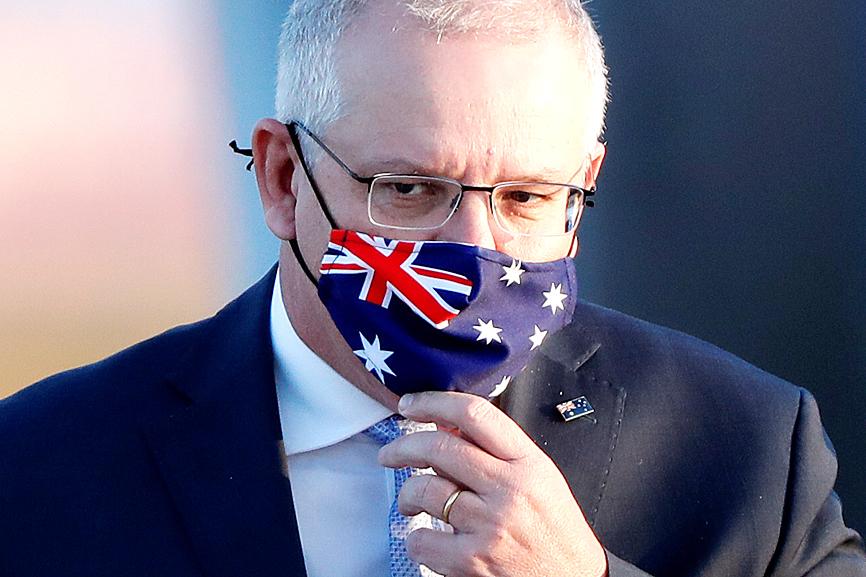Australian Prime Minister Scott Morrison yesterday said that a Chinese official’s post on Twitter showing a fake image of an Australian soldier appearing to slit an Afghan child’s throat was “truly repugnant” and merits an apology.
China said there would be no apology.
The incident is further souring already tense relations between the two nations.

Photo: Reuters
Morrison said he was seeking an apology from the Chinese government after Chinese Ministry of Foreign Affairs spokesman Zhao Lijian (趙立堅) posted the graphic image that shows a grinning soldier holding a bloodied knife to the throat of a veiled child, who is holding a lamb.
Zhao wrote a caption saying: “Shocked by murder of Afghan civilians & prisoners by Australian soldiers. We strongly condemn such acts, & call for holding them accountable.”
He was referring to a disturbing report by Australia’s military last month that found evidence that elite Australian troops unlawfully killed 39 Afghan prisoners, farmers and civilians, and recommended that 19 soldiers be referred to federal police for criminal investigation.
Asked about the issue at a daily briefing, ministry spokeswoman Hua Chunying (華春瑩) cast blame on the Australian side.
“What Australia should do is to reflect deeply, bring the perpetrators to justice, make a formal apology to the Afghan people, and solemnly promise to the international community that they will never commit such terrible crimes again,” Hua said.
Morrison said Zhao’s post was “utterly outrageous” and a terrible slur against Australia’s military.
It “is truly repugnant. It is deeply offensive to every Australian, every Australian who has served in that uniform,” he told reporters in Canberra. “The Chinese government should be totally ashamed of this post. It diminishes them in the world’s eyes.”
Morrison said his government had contacted Twitter asking it to take the post down.
The post had a warning tag on it by yesterday afternoon, but could still be viewed.
Zhao’s account comes with a Twitter label stating that it is a Chinese government account.
Morrison acknowledged there were tensions between China and Australia.
“But this is not how you deal with them,” he said. “Australia has patiently sought to address the tensions that exist in our relationship in a mature way, in a responsible way, by seeking engagement at both leader and ministerial level.”
The rift has grown since the Australian government called for an independent inquiry into the origins of the COVID-19 pandemic. China has since imposed tariffs and other restrictions on a number of Australian exports.

FREEDOM OF NAVIGATION: The UK would continue to reinforce ties with Taiwan ‘in a wide range of areas’ as a part of a ‘strong unofficial relationship,’ a paper said The UK plans to conduct more freedom of navigation operations in the Taiwan Strait and the South China Sea, British Secretary of State for Foreign, Commonwealth and Development Affairs David Lammy told the British House of Commons on Tuesday. British Member of Parliament Desmond Swayne said that the Royal Navy’s HMS Spey had passed through the Taiwan Strait “in pursuit of vital international freedom of navigation in the South China Sea.” Swayne asked Lammy whether he agreed that it was “proper and lawful” to do so, and if the UK would continue to carry out similar operations. Lammy replied “yes” to both questions. The

‘OF COURSE A COUNTRY’: The president outlined that Taiwan has all the necessary features of a nation, including citizens, land, government and sovereignty President William Lai (賴清德) discussed the meaning of “nation” during a speech in New Taipei City last night, emphasizing that Taiwan is a country as he condemned China’s misinterpretation of UN Resolution 2758. The speech was the first in a series of 10 that Lai is scheduled to give across Taiwan. It is the responsibility of Taiwanese citizens to stand united to defend their national sovereignty, democracy, liberty, way of life and the future of the next generation, Lai said. This is the most important legacy the people of this era could pass on to future generations, he said. Lai went on to discuss

MISSION: The Indo-Pacific region is ‘the priority theater,’ where the task of deterrence extends across the entire region, including Taiwan, the US Pacific Fleet commander said The US Navy’s “mission of deterrence” in the Indo-Pacific theater applies to Taiwan, Pacific Fleet Commander Admiral Stephen Koehler told the South China Sea Conference on Tuesday. The conference, organized by the Center for Strategic and International Studies (CSIS), is an international platform for senior officials and experts from countries with security interests in the region. “The Pacific Fleet’s mission is to deter aggression across the Western Pacific, together with our allies and partners, and to prevail in combat if necessary, Koehler said in the event’s keynote speech. “That mission of deterrence applies regionwide — including the South China Sea and Taiwan,” he

UNPRECEDENTED: In addition to the approved recall motions, cases such as Ma Wen-chun’s in Nantou are still under review, while others lack enough signatures The Central Election Commission (CEC) announced yesterday that a recall vote would take place on July 26, after it approved the first batch of recall motions targeting 24 Chinese Nationalist Party (KMT) lawmakers and Hsinchu Mayor Ann Kao (高虹安). Taiwan is in the midst of an unprecedented wave of mass recall campaigns, following a civil society push that echoed a call made by Democratic Progressive Party (DPP) caucus whip Ker Chien-ming (柯建銘) in January to initiate signature drives aimed at unseating KMT legislators. Under the Civil Servants Election and Recall Act (公職人員選舉罷免法), Taiwanese can initiate a recall of district-elected lawmakers by collecting